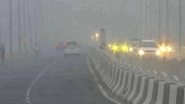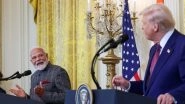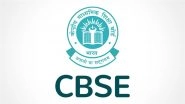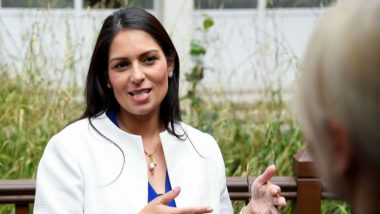London, June 3: UK Home Secretary Priti Patel on Wednesday laid out details of the UK's 14-day quarantine for all inbound international travellers from next Monday alongside a gradual easing of the coronavirus lockdown within the country.
Addressing the House of Commons, the Indian-origin Cabinet minister dashed any hopes for so-called “air bridges” with select countries and confirmed that the two-week self-isolation measure will apply to all travellers until the policy is set for its first review on June 28. Coronavirus Vaccine Update: From Ayurveda to Remdesivir And More, Here's What Progress India, US, China And Other Countries Have Made so Far.
The minister stressed that the new measures, which have faced criticism from the aviation industry as well as from MPs within the ruling Conservative Party, are designed to prevent new cases being brought in from abroad and to prevent a second wave of the virus.
"We are in a national health emergency right now. This isn't about the inconvenience of certain regulations and measures – we are here to make sure we protect public health first and foremost," Patel told MPs.
Under the new rules, all arrivals except a short list of exemptions, will be required to complete an online locator form to supply contact details, travel details and the address of where they will self-isolate for 14 days.
Where international travellers are unable to safely self-isolate in their own accommodation, the UK government says it will support them to find appropriate accommodation at their own expense.
Such passengers could be contacted regularly throughout the isolation period to ensure compliance. Public Health England (PHE) will contact people at random to ensure they understand the requirements and are self-isolating. Removal from the country would be considered as a last resort for foreign nationals who refuse to comply with these public health measures, the Home Office said.
Anyone failing to comply with the mandatory conditions may face enforcement action and a breach of self-isolation would be punishable with a 1,000 pounds fixed penalty notice in England or potential prosecution and unlimited fine.
“Protecting the public's health and avoiding a second peak that overwhelms the NHS (National Health Service) will always be our top priority,” said Patel.
“As we get the virus under control here, we must manage the risk of cases being imported from abroad. We owe it to the thousands who've lost their lives not to throw away our progress,” she said.
The UK's Border Force will undertake checks at the border and may refuse entry to any non-resident foreign nationals who refuse to comply with these regulations. Failure to complete the locator form is also punishable by a 100 pounds fixed penalty notice.
“To get the country and our economy back up and running, we must do everything to avoid a second wave of the virus, because if we get this wrong we will all suffer, and that's why introducing these measures now is so important,” said UK Transport Secretary Grant Shapps.
“These measures will be reviewed every few weeks, and we are working with the transport industry to see how we can introduce agreements with other countries when safe to do so, so we can go abroad and tourists can come here,” he said.
The government confirmed that arrangements known as “air bridges”, or international travel corridors which would remove self-isolation measures and safely open up routes to and from certain countries with low transmission rates, are under consideration on a bilateral basis.
These will be taken into consideration in time for the first review towards the end of this month, when the quarantine measures will be assessed based on a series of factors such as the rate of infection internationally and levels of imported cases in other countries with more open borders.
(The above story is verified and authored by Press Trust of India (PTI) staff. PTI, India’s premier news agency, employs more than 400 journalists and 500 stringers to cover almost every district and small town in India.. The views appearing in the above post do not reflect the opinions of LatestLY)













 Quickly
Quickly


